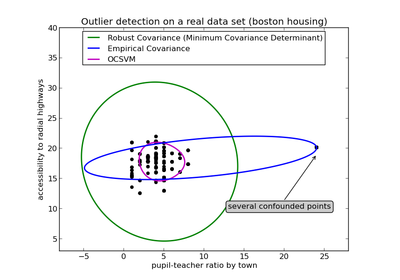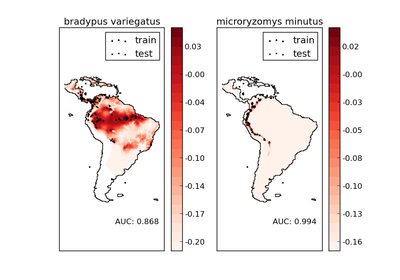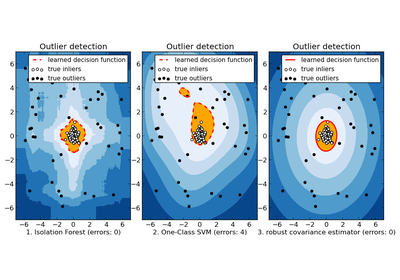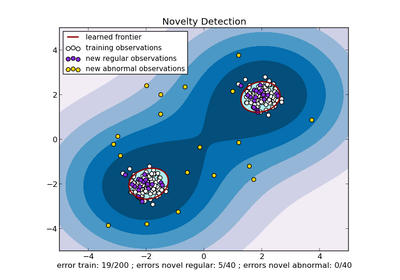sklearn.svm.OneClassSVM¶
- class sklearn.svm.OneClassSVM(kernel='rbf', degree=3, gamma='auto', coef0=0.0, tol=0.001, nu=0.5, shrinking=True, cache_size=200, verbose=False, max_iter=-1, random_state=None)[source]¶
Unsupervised Outlier Detection.
Estimate the support of a high-dimensional distribution.
The implementation is based on libsvm.
Read more in the User Guide.
Parameters: kernel : string, optional (default=’rbf’)
Specifies the kernel type to be used in the algorithm. It must be one of ‘linear’, ‘poly’, ‘rbf’, ‘sigmoid’, ‘precomputed’ or a callable. If none is given, ‘rbf’ will be used. If a callable is given it is used to precompute the kernel matrix.
nu : float, optional
An upper bound on the fraction of training errors and a lower bound of the fraction of support vectors. Should be in the interval (0, 1]. By default 0.5 will be taken.
degree : int, optional (default=3)
Degree of the polynomial kernel function (‘poly’). Ignored by all other kernels.
gamma : float, optional (default=’auto’)
Kernel coefficient for ‘rbf’, ‘poly’ and ‘sigmoid’. If gamma is ‘auto’ then 1/n_features will be used instead.
coef0 : float, optional (default=0.0)
Independent term in kernel function. It is only significant in ‘poly’ and ‘sigmoid’.
tol : float, optional
Tolerance for stopping criterion.
shrinking : boolean, optional
Whether to use the shrinking heuristic.
cache_size : float, optional
Specify the size of the kernel cache (in MB).
verbose : bool, default: False
Enable verbose output. Note that this setting takes advantage of a per-process runtime setting in libsvm that, if enabled, may not work properly in a multithreaded context.
max_iter : int, optional (default=-1)
Hard limit on iterations within solver, or -1 for no limit.
random_state : int seed, RandomState instance, or None (default)
The seed of the pseudo random number generator to use when shuffling the data for probability estimation.
Attributes: support_ : array-like, shape = [n_SV]
Indices of support vectors.
support_vectors_ : array-like, shape = [nSV, n_features]
Support vectors.
dual_coef_ : array, shape = [n_classes-1, n_SV]
Coefficients of the support vectors in the decision function.
coef_ : array, shape = [n_classes-1, n_features]
Weights assigned to the features (coefficients in the primal problem). This is only available in the case of a linear kernel.
coef_ is readonly property derived from dual_coef_ and support_vectors_
intercept_ : array, shape = [n_classes-1]
Constants in decision function.
Methods
decision_function(X) Distance of the samples X to the separating hyperplane. fit(X[, y, sample_weight]) Detects the soft boundary of the set of samples X. get_params([deep]) Get parameters for this estimator. predict(X) Perform regression on samples in X. set_params(**params) Set the parameters of this estimator. - __init__(kernel='rbf', degree=3, gamma='auto', coef0=0.0, tol=0.001, nu=0.5, shrinking=True, cache_size=200, verbose=False, max_iter=-1, random_state=None)[source]¶
- decision_function(X)[source]¶
Distance of the samples X to the separating hyperplane.
Parameters: X : array-like, shape (n_samples, n_features)
Returns: X : array-like, shape (n_samples,)
Returns the decision function of the samples.
- fit(X, y=None, sample_weight=None, **params)[source]¶
Detects the soft boundary of the set of samples X.
Parameters: X : {array-like, sparse matrix}, shape (n_samples, n_features)
Set of samples, where n_samples is the number of samples and n_features is the number of features.
sample_weight : array-like, shape (n_samples,)
Per-sample weights. Rescale C per sample. Higher weights force the classifier to put more emphasis on these points.
Returns: self : object
Returns self.
Notes
If X is not a C-ordered contiguous array it is copied.
- get_params(deep=True)[source]¶
Get parameters for this estimator.
Parameters: deep: boolean, optional :
If True, will return the parameters for this estimator and contained subobjects that are estimators.
Returns: params : mapping of string to any
Parameter names mapped to their values.
- predict(X)[source]¶
Perform regression on samples in X.
For an one-class model, +1 or -1 is returned.
Parameters: X : {array-like, sparse matrix}, shape (n_samples, n_features)
For kernel=”precomputed”, the expected shape of X is (n_samples_test, n_samples_train).
Returns: y_pred : array, shape (n_samples,)
- set_params(**params)[source]¶
Set the parameters of this estimator.
The method works on simple estimators as well as on nested objects (such as pipelines). The former have parameters of the form <component>__<parameter> so that it’s possible to update each component of a nested object.
Returns: self :






